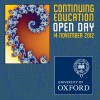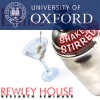Department for Continuing Education

Oxford was one of the pioneers of the University Extension movement in the United Kingdom, and we still retain our original mission of making the scholarship of the University accessible to wider audiences.
In recent years the Department has grown very considerably, and now every year more than 15,000 people join one or more of our courses. Our students may be members of the public who wish to study a subject out of general interest or for personal satisfaction, members of professional groups or business organisations who wish to update their professional knowledge and skills, or participants in our increasingly large number of courses for international groups.
Most of our longer courses now lead to a University award or other forms of credit but the large number of short courses on offer may be taken by those who are less interested in obtaining further qualifications. Courses last from one day to several weeks; the residential courses are held in Oxford but other part-time courses are also held in a large number of other centres.
Series associated with Department for Continuing Education
| # | Episode Title | Description | People | Date | |
|---|---|---|---|---|---|
| 149 | Creative Commons | Design during the War: the seventh Triennale in Milan and the Mostra della produzione in serie (Serial production exhibition, 1940) | The Serial production exhibition, by Giuseppe Pagano, opens a new attitude in Italian design. The most advanced industrial products are shown to the public: typewriters, calculators, metal furnitures, microscopes, optical instruments, raincoats and so on. | Alberto Bassi | 28 Sep 2014 |
| 148 | Creative Commons | ENIAC versus Colossus and the early presentation of electronic computers | A description of the concurrent yet different development of electronic computers during WWII in the UK and US– most notably the secrecy of the UK development compared to the widely known work in the US and the consequent effects on the computing industry | Paul Atkinson | 28 Sep 2014 |
| 147 | Creative Commons | ‘Propaganda in Three Dimensions’: British Ministry of Information Exhibitions During World War Two | Exhibitions designed by the British Ministry of Information exhibitions branch during World War Two as official propaganda: their methods and impact. | Harriet Atkinson | 28 Sep 2014 |
| 146 | Danger | Speakers for our seminar on the theme of Danger have Medical and Humanities backgrounds, and will consider the following: experimentation to diminish danger; the risks of ignoring danger, danger to the self and the ideal. | Marion Kibuka, Yasmin Khan, Anna Beer | 12 Aug 2014 | |
| 145 | Creative Commons | Truth | The presentations invite us to consider what truth means to people in different circumstances, and how definitions of truth can affect decision-making, from literary risks to clinical trials. | Anne Jensen, Rosemary Yallop, Carl Heneghan, Yasmin Khan | 12 Aug 2014 |
| 144 | Creative Commons | Patterns | Three speakers share their insights into pattern exploration and, in some cases, exploitation, in their fields of finance, mathematics and climate change. | Bob Lockhart; Kevon Rhiney; David Howard | 12 Aug 2014 |
| 143 | Creative Commons | Was Schubert a musical brain? | Prof. Raymond Tallis deepens his argument against the idea that we are our brains. He believes there is a distinction in kind between humans and other animals. This he illustrates by appeal to the differences between the music of Schubert and the singing | Raymond Tallis | 07 May 2014 |
| 142 | Creative Commons | Spiders, yes, but why cats? | Prof.Iain McGilchrist illustrates his argument by appeal to a number of paintings done by psychotic patients. He points to various commonalities between these paintings and speculates on the ways in which they support claims about the two hemispheres and | Iain McGilchrist | 07 May 2014 |
| 141 | Creative Commons | Am I my mind? | Prof. Iain McGilchrist, whilst agreeing with Tallis that we are not our brains argues that we can learn a great deal about our culture by learning more about our brain. In particular we should recognise we have two hemispheres, each with a different funct | Iain McGilchrist | 07 May 2014 |
| 140 | Creative Commons | Am I my brain? | Prof. Raymond Tallis argues that extraordinary claims have been made for neurophysiology. For example it has been said that a person is nothing but his or her brain. Professor Raymond Tallis rejects this ‘neuromania’. He shows why it is attractive, but al | Raymond Tallis | 07 May 2014 |
| 139 | The Truth about Art 3 - Aesthetics | Another ancient belief held that an art should be governed by rules. | Patrick Doorly | 11 Apr 2014 | |
| 138 | The Truth about Art 1 - Mystery or Mastery | E.H. Gombrich famously observed that 'there really is no such thing as Art' (with a capital A). | Patrick Doorly | 11 Apr 2014 | |
| 137 | Future | The presentations focus on the impact of the concept of future in changing debate, and how, in specific instances, concerns about the future affect behaviours in the present. | David Howard, Jill Hind | 07 Apr 2014 | |
| 136 | Creative Commons | Answers to Questions | Answers to Questions posed in lectures 1 to 6 of Marianne Talbot's lecture series on critical reasoning for beginners. | Marianne Talbot | 20 Mar 2014 |
| 135 | Creative Commons | Fallacies: Understanding where Arguments go Wrong | Lecture 6 of 6 in Marianne Talbot's series on critical reasoning for beginners. | Marianne Talbot | 20 Mar 2014 |
| 134 | Creative Commons | Inductive Strength: Evaluating Inductive Arguments | Lecture 5 of 6 in Marianne Talbot's series on critical reasoning for beginners. | Marianne Talbot | 20 Mar 2014 |
| 133 | Creative Commons | Deductive Validity: Evaluating Deductive Arguments | Lecture 4 of 6 in Marianne Talbot's series on critical reasoning for beginners. | Marianne Talbot | 20 Mar 2014 |
| 132 | Creative Commons | Deduction and Induction: Classifying Arguments | Lecture 3 of 6 in Marianne Talbot's series on critical reasoning for beginners. | Marianne Talbot | 20 Mar 2014 |
| 131 | Creative Commons | Analysing Arguments: How to Identify Premises and Conclusions | Lecture 2 of 6 in Marianne Talbot's series on critical reasoning for beginners. | Marianne Talbot | 20 Mar 2014 |
| 130 | Creative Commons | The Nature Of Argument: How to Recognise Arguments | Lecture 1 of 6 in Marianne Talbot's series on critical reasoning for beginners. | Marianne Talbot | 20 Mar 2014 |
| 129 | Creative Commons | An Introduction to the Oxford University International Politics Summer School | A short introduction to the Oxford University International Politics Summer School by the Programme Director and students. | Paul Chaisty, Mohammed Al Hinai, Fiona Glenister, Nelleke Hijmans | 10 Mar 2014 |
| 128 | Creative Commons | An Introduction to the Oxford University Creative Writing Summer School | A short introduction to the Oxford University Creative Writing Summer School by the Programme Director and students. | Tara Stubbs, John Collins, Dalia Hosn, Nathan Smale | 10 Mar 2014 |
| 127 | ‘Archaeology in Practice’ at Oxford University Department for Continuing Education | Information about the online short course: ‘Archaeology in Practice’ and other online short courses. | Wendy Morrison | 10 Mar 2014 | |
| 126 | Creative Commons | Studying archaeology at Oxford University Department for Continuing Education | Information about the range of part-time archaeology courses on offer at Oxford University Department for Continuing Education. | David Griffiths | 10 Mar 2014 |
| 125 | The archaeology training excavation at Dorchester-on-Thames | Students on the Undergraduate Certificate in Archaeology learn a range of archaeological techniques on the training excavation at Dorchester-on-Thames, Oxfordshire. | Wendy Morrison, Jeanne Peskett, William Garrard, David Griffiths | 10 Mar 2014 | |
| 124 | Creative Commons | Britain's economic problems and prospects | At the time of the 2008 global credit crunch, I participated in Oxford's online debate on whether the economic crisis sounded the death knell for laissez faire capitalism. | Jonathan Michie | 07 Oct 2013 |
| 123 | Party games: coalition government in British politics | This session will look at the history of coalition government in British politics over the past 200 years and discuss some of the constitutional implications of the current Conservative-Liberal Democrat government under David Cameron and Nick Clegg. | Angus Hawkins | 07 Oct 2013 | |
| 122 | Creative Commons | Philosophy in 45 minutes! | Philosophy deals with the BIG questions of life: does God exist? How should we live? What is truth? What are numbers and do we need them? Does space come to an end or is it infinite? NO SOUND FOR FIRST 3 MINUTES. | Marianne Talbot | 07 Oct 2013 |
| 121 | Fitzgerald beyond Gatsby | With the recent resurgence in interest in F. Scott Fitzgerald following Baz Luhrmann's imaginative film adaptation of Fitzgerald's 1925 novel The Great Gatsby have come the inevitable cliches of the 'lost generation' and the 'American dream'. | Tara Stubbs | 07 Oct 2013 | |
| 120 | Creative Commons | Gustav Klimt and secessionist Vienna | Vienna around 1900 witnessed a vital and anxious surge in art, design, literature and music. This creativity also inspired psychological investigations into the inner self and dreams, most famously by Sigmund Freud. | Claire O'Mahony | 07 Oct 2013 |
| 119 | Creative Commons | Surprises - for you and for mathematics | In 1900, pure mathematics had the smug air of a finished product. We thought we knew what it was and we thought we knew how it was done. | Bob Lockhart | 07 Oct 2013 |
| 118 | International education: the transformative effect of student migration | In this short lecture we will consider what the internationalisation of higher education means, and the global implications of international mobility - on the students, on their 'receiving' countries and on their places of origin. | Johanna Waters | 07 Oct 2013 | |
| 117 | Why music matters in your life | Imagine a world without music. No music on the radio, no concerts, no musical instruments. No background music in films and television. No music at our weddings, funerals, religious worship or sporting events. | Jonathan Darnborough | 07 Oct 2013 | |
| 116 | Creative Commons | Where's all the wildlife? Flooding and the importance of landscape conservation | The Oxfordshire floods of 2007, 2008 and 2012 caused enormous disruption to homes, agriculture and local businesses, but what were the consequences for wildlife? | Kerry Lock | 07 Oct 2013 |
| 115 | Creative Commons | What's so great about Austen? Isn't she just bonnets and balls? | Some film and tv adaptations of Jane Austen's novels might give the impression that the stories are little more than Mills and Boon-type romances in empire-line frocks. | Sandie Byrne | 07 Oct 2013 |
| 114 | Creative Commons | Too many words? An irreverent guide to screenwriting | Aristotle's 'Poetics' is regarded as the earliest surviving work of dramatic theory. How much notice do Goldman, Godard, Bertolucci or indeed Tarantino pay to his classic tenets of drama? | Victor Glynn | 04 Oct 2013 |
| 113 | Creative Commons | Who needs migrant workers? Controversies in international labour migration | The regulation of labour immigration is among the most important and controversial public policy issues in high-income countries. | Martin Ruhs | 04 Oct 2013 |
| 112 | Creative Commons | A history of England in five and a half maps | There is a story behind every map. Generation after generation, we have imprinted ourselves on the land we live upon. Our depictions of that land, in maps, have recorded social attitudes and social change like no other source. | Jonathan Healey | 04 Oct 2013 |
| 111 | Creative Commons | Spotlight on Archaeology | Find out about how archaeologists uncover the past using a range of techniques, including excavation, survey and scientific analysis. | Alison MacDonald | 04 Oct 2013 |
| 110 | Anniversaries, feasts and commemoration in the Middle Ages | Ritual celebrations were at the heart of life in medieval communities. The passage of time was articulated by the cycle of the seasons, the exigencies of husbandry and of trade, all inextricably bound up with religious holidays and anniversaries. | Elizabeth Gemmill | 04 Oct 2013 | |
| 109 | Speaking stories: the oral roots of poetry | We'll be looking at Beowulf and the epic as a way of passing on experience and history. See your own life as an epic! Where would you start? What would you leave out? Surprise yourself - and us! | Jenny Lewis | 04 Oct 2013 | |
| 108 | Creative Commons | The art of war: The Hundred Years' War in twenty objects | This lecture will examine one of the longest wars in history, fought between England and France from 1337 to 1453 by scrutinising twenty objects. | Janina Ramirez | 04 Oct 2013 |
| 107 | Postcolonial futures: the Caribbean in dialogue | Dr Kevon Rhiney, Commonwealth Fellow and lecturer (Department of Geography and Geology, University of the West Indies) considers contemporary social and economic development in Jamaica, in the light of environmental vulnerability and climate change. | David Howard, Kevon Rhiney | 12 Jun 2013 | |
| 106 | Gender | Gender relations shape our everyday interactions at work, on the street and in the home. Our speakers cover a wide range of topics, from historical, legal and therapeutic perspectives. | Linda Scott, Frances Richardson, Nazila Ghanea-Hercock, Alistair Ross | 12 Jun 2013 | |
| 105 | Learning and Work in Medieval England | Did Medieval people go on learning through their adult life? If so, what kind of things did they learn about, who taught them, and how was it done? This lecture was delivered 23rd May 2013 as part of national Adult Learners' Week. | Elizabeth Gemmill | 29 May 2013 | |
| 104 | Creative Commons | Decay | The presentations focus on the importance of disappearance as much as appearance, presence as well as absence, and growth in the guise of degeneration, arguing from difference perspectives for the importance of malaise or corrosion as a subject of study. | David Howard, Martin Neubert, Robert Vanderplank, Tara Stubbs | 22 May 2013 |
| 103 | Creative Commons | The Num8er My5teries | Professor Marcus du Sautoy - mathematician, footballer and amateur musician - shows how mathematicians have contributed to our understanding of the world around us for millennia. | Marcus du Sautoy | 19 Dec 2012 |
| 102 | Economics: which way now? | Dr Martin Ruhs introduces the Department's expanding portfolio of economics courses, in the context of the on-going debate about where economics is headed, starting with the world economic downturn. | Martin Ruhs | 19 Dec 2012 | |
| 101 | Creative Commons | Henry II and the Twelfth-Century World | Dr Elizabeth Gemmill introduces the most remarkable monarch, Henry II, whose dominions stretched from the south west of France to the north of Britain. His achievements have lasted until our own times, but his reign was marred by tragedy too. | Elizabeth Gemmill | 19 Dec 2012 |
| 100 | Creative Commons | W.B. Yeats and the Ghost Club | Dr Tara Stubbs uses exciting new research findings to discuss the close links between Yeats's attendances at the Ghost Club during the 1910s-1920s, his (sometimes amusing) spiritualist experiments, and his poetic works. | Tara Stubbs | 19 Dec 2012 |
| 99 | Creative Commons | Boulevards, Brushwork and Bugattis : Modern Art and Design in Paris | In the nineteenth-century Paris was transformed into an alluring spectacle of cafés, department stores and exhibitions. Dr Claire O'Mahony looks at the inspiration of the modern city of light from Impressionist painters to the glamour of Art Deco. | Claire O'Mahony | 19 Dec 2012 |
| 98 | Creative Commons | Philosophy in 45 minutes! | Marianne Talbot takes participants on a romp through the nature of philosophy for complete beginners discussing some of the BIG questions of life: does God exist? How should we live? What is truth? Does space come to an end or is it infinite? | Marianne Talbot | 19 Dec 2012 |
| 97 | Creative Commons | From global credit-crunch to Eurocrisis and double-dip recession: whatever next? | The 25 years up to the 2007-8 global credit crunch were ones of privatisation, deregulation, financialisation and, in the UK, demutualisation. Professor Jonathan Michie will discuss the causes and consequences of the global credit crunch. | Jonathan Michie | 19 Dec 2012 |
| 96 | Creative Commons | Shedding light on the dark ages | The Dark Ages are traditionally seen as nasty, brutish and short - a cultural and intellectual waste land, with virtually nothing worthy of art historical consideration. But Janina argues this is far from the truth. | Janina Ramirez | 05 Dec 2012 |
| 95 | Creative Commons | Fullbright Lecture 2012: When can international intervention be justified and effective? | The doctrine of the international community's responsibility to protect the citizens of a country whose government has failed them has strengthened the presumption in favour of international intervention for humanitarian reasons. | Sir John Holmes | 05 Dec 2012 |
| 94 | Morphogenesis Then and Now | Philip Maini, Oxford University, gives a talk for the Alan Turing Centenary weekend. | Philip Maini | 22 Oct 2012 | |
| 93 | Congruent Worlds: Turing, Lovelace and Babbage | Doron Swade, Royal Holloway, Univ. of London, gives a talk for the Alan Turing Centenary weekend. | Doron Swade | 22 Oct 2012 | |
| 92 | What Alan Turing might have discovered | Stephen Wolfram, founder and CEO of Wolfram Research and creator of Mathematica, gives a talk for the Alan Turing Centenary weekend. | Stephen Wolfram | 22 Oct 2012 | |
| 91 | Creative Commons | Turing in the History of Software | Cliff Jones, Newcastle University, gives a talk for the Alan Turing Centenary Weekend. | Cliff jones | 22 Oct 2012 |
| 90 | Creative Commons | Turing in the age of the Internet and the quantum computer | Samson Abramsky, Oxford University, gives a talk for the Alan Turing Centenary weekend. | Samson Abramsky | 22 Oct 2012 |
| 89 | Creative Commons | Decidability: The Entscheidungs problem | Robin Whitty, London South Bank University, gives a talk for the Alan Turing Centenary weekend. | Robin Whitty | 22 Oct 2012 |
| 88 | Creative Commons | Turing and the Public Consciousness: Turing 2.0(12) | Sue Black, University College London, Turing and the Public Consciousness: Turing 2.0(12). | Sue Black | 22 Oct 2012 |
| 87 | Creative Commons | Welcome Address | Jonathan Bowen, London South Bank University. | Jonathan Bowen | 22 Oct 2012 |
| 86 | Can robots be made creative enough to invent their own language? | Luc Steels delivers the 2012 Simonyi lecture and asks can machines be creative enough to invent their own language? | Luc Steels, Marcus du Sautoy | 18 Oct 2012 | |
| 85 | Creative Commons | Creating a 'John Lewis' economy? - encouraging Corporate Diversity for Sustainable Growth | The Coalition Government is committed to greater corporate diversity in the financial services sector, and are promoting 'John Lewis' style mutuals to deliver public services. | Jonathan Michie | 02 Oct 2012 |
| 84 | Creative Commons | Ethics | Ethical decisions, and often dilemma, lie at the heart of all research methodologies and practice. Marianne Talbot, course director in Philosophy, chaired three presentations from across the disciplines. | Marianne Talbot, Abi Sriharan, Kate Blackmon, David Griffiths | 20 Jun 2012 |
| 83 | Revolution | Revolutionary concepts continually shape and uproot research agendas, and occasionally researchers themselves. This seminar examined the many ways revolution impacts on research. | Adrian Stokes, Kerry Lock, Peter Watson | 20 Jun 2012 | |
| 82 | Risk | The inaugural research seminar invited three speakers to consider how the concept and experience of 'risk' influenced their current research. | David Howard, Jonathan Michie, Nigel Mehdi, Adam Josephs | 20 Jun 2012 | |
| 81 | Creative Commons | Reading List for Bioethics: An Introduction | Reading List to accompany the Bioethics: An Introduction podcast series. | Marianne Talbot | 30 May 2012 |
| 80 | Creative Commons | Common moral arguments: 'morality? It's all a matter of opinion' | Final of nine short introductory podcasts on Bioethics by Marianne Talbot. | Marianne Talbot | 29 May 2012 |
| 79 | Creative Commons | Common moral arguments: 'it's too risky' (the Precautionary Principle) | Eighth of nine short introductory podcasts on Bioethics by Marianne Talbot. | Marianne Talbot | 29 May 2012 |
| 78 | Creative Commons | Common moral arguments: 'it's not natural' and 'it's disgusting' | Seventh of nine short introductory podcasts on Bioethics by Marianne Talbot. | Marianne Talbot | 29 May 2012 |
| 77 | Creative Commons | Induction | Sixth of nine short introductory podcasts on Bioethics by Marianne Talbot. | Marianne Talbot | 29 May 2012 |
| 76 | Creative Commons | Deduction | Fifth of nine short introductory podcasts on Bioethics by Marianne Talbot. | Marianne Talbot | 29 May 2012 |
| 75 | Creative Commons | Arguments | Fourth of nine short introductory podcasts on Bioethics by Marianne Talbot. | Marianne Talbot | 29 May 2012 |
| 74 | Creative Commons | Utilitarianism | Third of nine short introductory podcasts on Bioethics by Marianne Talbot. | Marianne Talbot | 29 May 2012 |
| 73 | Creative Commons | Deontology | Second of nine short introductory podcasts on Bioethics by Marianne Talbot. | Marianne Talbot | 29 May 2012 |
| 72 | Creative Commons | Virtue Ethics | First of nine short introductory podcasts on Bioethics by Marianne Talbot. | Marianne Talbot | 29 May 2012 |
| 71 | Inspector Morse in Print and on TV | Highly acclaimed crime writer Colin Dexter, OBE, talks at the Crime Fiction Day at St John's College, University of Oxford, on the theme of Inspector Morse. | Colin Dexter | 15 May 2012 | |
| 70 | Creative Commons | Dons, Deaths and Detectives: Oxford in Crime Fiction | Professor Colin Bundy, University of Oxford, talks at the Crime Fiction Day at St John's College around the history of detective fiction in Oxford. | Colin Bundy | 15 May 2012 |
| 69 | Cluedo and Cadavers: British Detective Fiction | Peter Kemp, the Sunday Times fiction editor, talks at the Crime Fiction Day at St John's College, University of Oxford, on the theme of British Detective Fiction. | Peter Kemp | 15 May 2012 | |
| 68 | Creative Commons | Further reading and more... | So you've finished this series of podcasts. Find out where to go from here... | Marianne Talbot | 16 Apr 2012 |
| 67 | Creative Commons | Reading List | Reading list for the Philosophy for Beginners series of podcasts. | Marianne Talbot | 16 Apr 2012 |
| 66 | Creative Commons | Further reading and more... | So you've finished this series of podcasts. Find out where to go from here... | Marianne Talbot | 16 Apr 2012 |
| 65 | Creative Commons | Further reading and more... | So you've finished this series of podcasts. Find out where to go from here... | Marianne Talbot | 16 Apr 2012 |
| 64 | Creative Commons | Further reading and more... | So you've finished this series of podcasts. Find out where to go from here... | Marianne Talbot | 16 Apr 2012 |
| 63 | Creative Commons | Part 5: Questions and Answers | Marianne Talbot presents the last of five episodes of the Romp through the Philosophy of Mind, engaging in a questions and answers discussion with the audience. | Marianne Talbot | 10 Apr 2012 |
| 62 | Veterinary Vaccines: Protecting livestock - saving human life | Lecture given by Dr Michael Witty, former Chairman, GALVmed, during Human and Veterinary Vaccinology short course November 2011. | Michael Witty | 16 Mar 2012 | |
| 61 | Effective Introduction of New Vaccines: "the UK experience" | Lecture given by Prof David Salisbury, Director of Immunisation, UK Department of Health, during Human and Veterinary Vaccinology short course November 2011. | David Salisbury | 16 Mar 2012 | |
| 60 | Creative Commons | Part 4: Are We Asking the Wrong Questions? | Marianne Talbot presents the fourth of five episodes of the Romp through the Philosophy of Mind, wondering if we are asking the wrong questions? | Marianne Talbot | 07 Feb 2012 |
| 59 | Creative Commons | Part 3: If Physicalism Won't Work, What is the Alternative? | Marianne Talbot presents the third of five episodes of the Romp through the Philosophy of Mind, on alternatives to Physicalism. | Marianne Talbot | 07 Feb 2012 |
| 58 | Creative Commons | Part 2: Non-Reductive Physicalisms and the Problems they Face | Slides to accompany Marianne Talbot's second of five episodes of the Romp through the Philosophy of Mind, on Non-Reductive Physicalisms and the problems they face. | Marianne Talbot | 07 Feb 2012 |
| 57 | Creative Commons | Part 1: Identity Theory and Why it Won't Work | Marianne Talbot presents the first of five episodes of the Romp through the Philosophy of Mind, on Identity Theory and why it won't work. | Marianne Talbot | 07 Feb 2012 |
| 56 | Creative Commons | Making Up Your Mind | Part 7 of 7 in Marianne Talbot's "A Romp Through Ethics for Complete Beginners". This final episode is a time to take stock and bring together all the strands we've considered. | Marianne Talbot | 08 Aug 2011 |
| 55 | Creative Commons | Utilitarianism: Mill and the utility calculus | Part 6 of 7 in Marianne Talbot's "A Romp Through Ethics for Complete Beginners". A reflection on Mill's account of morality, and the greatest happiness of the greatest number. | Marianne Talbot | 27 Jun 2011 |
| 54 | Creative Commons | Deontology: Kant, duty and the moral law | Part 5 of 7 in Marianne Talbot's "A Romp Through Ethics for Complete Beginners". In this episode we reflect on Kant's account of morality, including the categorical imperative. | Marianne Talbot | 03 Jun 2011 |
| 53 | Creative Commons | Humean Ethics: Non-Cognitivism, the passions and moral motivation | Part 4 of 7 in Marianne Talbot's "A Romp Through Ethics for Complete Beginners". In this episode we reflect on Hume's account of morality and his rejection of reason as the source of morality. | Marianne Talbot | 02 Jun 2011 |
| 52 | Creative Commons | Virtue Ethics: virtue, values and character | Part 3 of 7 in Marianne Talbot's "A Romp Through Ethics for Complete Beginners". In this episode we will reflect on Aristotle's account of morality and the centrality of the virtues in this account. | Marianne Talbot | 24 May 2011 |
| 51 | Creative Commons | Freedom, knowledge and society: the preconditions of ethical reasoning | Part 2 of 7 in Marianne Talbot's "A Romp Through Ethics for Complete Beginners". In this episode we examine the preconditions of ethical reasoning and make a comparison between the law of the land and the moral law. | Marianne Talbot | 20 May 2011 |
| 50 | Creative Commons | Rules, truths and theories: an introduction to ethical reasoning | Part 1 of 7 in Marianne Talbot's "A Romp Through Ethics for Complete Beginners". In this episode we examine moral dilemmas, moral truth and moral knowledge, freewill and determinism. | Marianne Talbot | 19 May 2011 |
- ‹ previous
- 2 of 3
- next ›
































